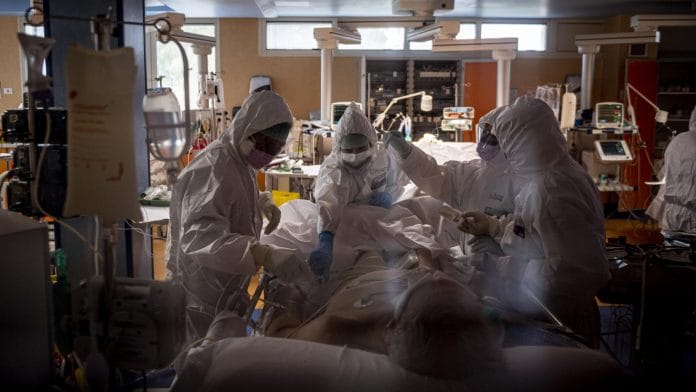New Delhi: The Covid-19 pandemic has so far claimed over 310,000 lives globally, yet scientists are still learning new things about the virus that has brought the world to a standstill.
Here are some of the latest research developments around SARS-CoV-2.
Portable sensor, Internet of Things to monitor Covid-19 patients
A Brazilian startup has developed a system based on the Internet of Things that can remotely monitor people with suspected Covid-19 or mild symptoms of the disease.
The system consists of a portable wireless sensor that is placed on the patient’s index finger to capture oxygen saturation and heart rate data. This information gets collected in real time by a smartphone app and can be remotely accessed and monitored by a medical team.
If the system shows a drop in oxygen saturation, the team can contact the patient or an on-site carer. Low oxygen saturation is one of the main warning signs of a deteriorating condition in the case of Covid-19.
Based on the oxygen saturation and heart rate data, the team can advise an immediate course of action, such as whether the patient needs to be hospitalised.
Two private hospitals in São Paulo, the epicenter of the pandemic in Brazil, will test the technology.
Also read: Every scientific success is built on a history of failures, Covid-19’s cure could be too
Clinical trial to test male hormone suppressor against Covid-19
Scientists have launched a new clinical trial to test whether a hormone suppressor — commonly used to treat men with prostate cancer — may help improve clinical outcomes for male Covid-19 patients.
The trial, led by researchers from the University of California, Los Angeles, will assess if temporarily suppressing male hormones will reduce the severity of Covid-19 by helping patients get out of the hospital faster, decrease the need for ventilators and improve mortality.
Recent studies have shown that men are not only getting infected in greater numbers, but also dying at nearly twice the rate of women patients, the researchers have said.
Prostate cancer patients have abnormal levels of a protein receptor called TMPRSS2, which plays a role in the development and progression of prostate cancer.
The same receptor also allows virus to enter the lungs and attack lung tissue, the team said. Since the receptor is regulated by male hormones in prostate cancer patients, the researchers believe it may also be regulated in lung tissue by male hormones.
Blood clots causing renal failure, stroke in Covid-19 patients
Critically-ill Covid-19 patients are at high risk of complications associated with blood clots causing renal failure, venous blood clots, as well as stroke.
Researchers from the University of Colorado in the US used a combination of two specific blood clotting tests to study how blood clotting measurements were linked to patient outcomes.
The team will now take part in a randomised clinical trial of a drug that breaks down blood clots in Covid-19 patients.
People who are critically-ill, regardless of the cause, can develop a condition known as disseminated intravascular coagulation (DIC) where many blood clots initially form in the smaller vessels.
In Covid-19 patients, however, the clotting appears to be particularly severe and clots do not appear to dissipate.
Treatment with interferon-α2b speeds up recovery
Treatment with antivirals known as interferons may significantly improve virus clearance and reduce levels of toxic proteins in Covid-19 patients, a study has suggested.
Researchers who conducted a small study on 77 confirmed Covid-19 patients in Wuhan found that treatment with interferon (IFN)-α2b helped clear the virus in the upper respiratory tract and reduced blood levels of inflammatory proteins found in the human body.
Interferon IFN-α therapy had benefits during the SARS outbreak of 2002 and 2003, the researchers said.
In the current study, the researchers examined the course of disease in 77 patients who had moderate symptoms of Covid-19. None of them required intensive care or oxygen support.
Patients were either treated with IFN-α2b, arbidol (ARB), which is a broad-spectrum antiviral, or a combination of IFN-α2b plus ARB. Throat swab samples were tested for the virus.
IFN-α2b treatment accelerated viral clearance by about seven days.
Also read: The real reason why countries with women leaders are handling Covid crisis better






